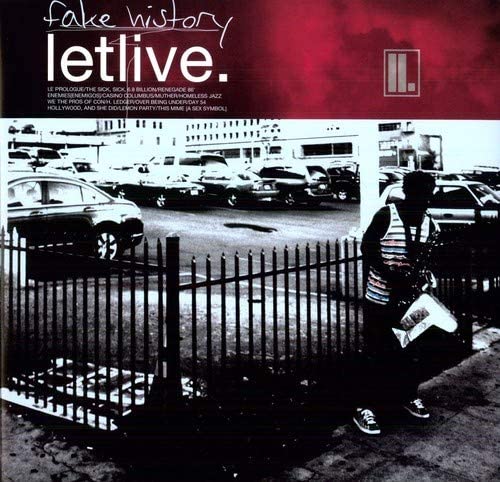It Holds Up: Letlive – ‘Fake History’ (2010)
Posted: by admin


It’s hard to overstate how stale the post-hardcore/metalcore scene had gotten by 2010. Death growls over chugging breakdowns, saccharine autotuned hooks, lyrics about murdering one’s ex-girlfriend – it seemed every band wanted to be the next Asking Alexandria or Devil Wears Prada. It was like focus group metalcore, designed to pull the biggest crowds at the Warped Tour that year, all sounding the same, all looking the same, all about the same things. Then there was letlive.
The Los Angeles five-piece carved out a sound that was distinctly their own. In very good part this was due to the band’s eccentric frontman Jason Aalon Butler. Butler’s range was one of the more impressive for the genre, as he could shift seamlessly from ferocious shrieks to falsetto on the drop of a dime. Although Butler frequently garnered comparisons to Daryl Palumbo of Glassjaw (a band whose influence clearly shines through on Fake History), Butler’s voice seemed as suited for R&B as hardcore, a little closer to scene staples like Jonny Craig or Bradley Walden – the crucial difference between Butler and the latter two being his ear for melody. “H. Ledger,” for example, is one of the more aggressive songs on the record – until the chorus hits, at which point it becomes one of the most melodic. “Let’s just say I never got an angel, but I’ve got some skeletons myself,” Butler croons in one of the catchiest moments of the record, and it doesn’t feel out of place at all. “We, the Pros of Con” is another exemplar of his range, as the hook displays that Butler can sound straight-up gorgeous when he wants, crafting radio-ready earworms moments before unleashing throat-shredding screams. His lyrics are worth a mention, too; at a time when most heavy bands were writing misogynistic screeds about their exes, Butler was a little more conscious, tackling topics like imperialism, racism, and the justice system throughout the album’s 45 minutes. Butler’s critiques of the American way remain relevant now, perhaps even more than in 2010.
As captivating as Butler’s performance is, it would be unfair not to mention the band behind him. Part of what really sells Fake History is how creative it is. It’s clear from just one listen letlive wasn’t afraid to work outside the conventions of the genre. The band’s biggest single, the album’s centerpiece “Muther,” dissolves from a frenetic post-hardcore jam into a jazz piano waltz about midway through, completely changing tempo and rebuilding itself from scratch – it’s nearly two separate songs, but it flows together perfectly. Speaking of jazz, it feels about right to mention Ryan Jay Johnson, letlive’s unsung hero, and his jazzy, intricate drumwork. He nearly singlehandedly carries the relatively sparse “Over Being Under” and the groovy “Enemies (Enemigos).” The band plays around with with atmosphere on “Enemies (Enemigos)” to create one of the more unique songs in the genre. Elsewhere, the bluesy swagger of “Homeless Jazz” gives way to a delicate acoustic bridge that builds into a pummelling and cathartic denouement. They’re moments of space and texture that, like the infectious as hell choruses, should feel out of place, but work perfectly in context and, more than that, feel totally natural.
Even the more traditional songs on the record feel distinctly letlive. The record scratches in “Casino Columbus,” otherwise the least remarkable song on Fake History, keep it fresh, and “The Sick Sick 6.8 Billion” has a jittery, unpredictable structure – jumping through three different verses before even the first chorus, and following that with five more distinct verses before repeating the hook – that gives it a feeling of spontaneity, as though the song just fell together in disparate pieces and happened to turn out a masterpiece.
It’s that quality that comes through most on Fake History, that feeling of spontaneity. No moment on the album feels rehearsed or manufactured – it all feels organic and necessary. Fake History was the band’s third record, first with a new lineup, and first in half a decade, and it’s clear it was a new beginning for the band. There’s a sense of urgency throughout the record that shouldn’t be unfamiliar to fans of Bruce Springsteen (no, seriously). The Boss’ first two records, while critically acclaimed, flopped in terms of sales and Born to Run was his last-ditch effort to salvage his music career – everyone knows how that turned out. While Fake History might not be the Born to Run of post-hardcore, it has that same do-or-die energy. The band was never able to capture that magic again, but Fake History stands even now as a high watermark for the genre. Even as many of their more generic contemporaries have disbanded and bands like Greyhaven and The Callous Daoboys are making boundary-pushing and gripping hardcore, letlive’s opus is a reminder that while trends may fade, passion is forever.
—
Zac Djamoos | @gr8whitebison
The Alternative is ad-free and 100% supported by our readers. If you’d like to help us produce more content and promote more great new music, please consider donating to our Patreon page, which also allows you to receive sweet perks like free albums and The Alternative merch.










